A mother’s search for missing son leads to dark world of a marijuana dispensary
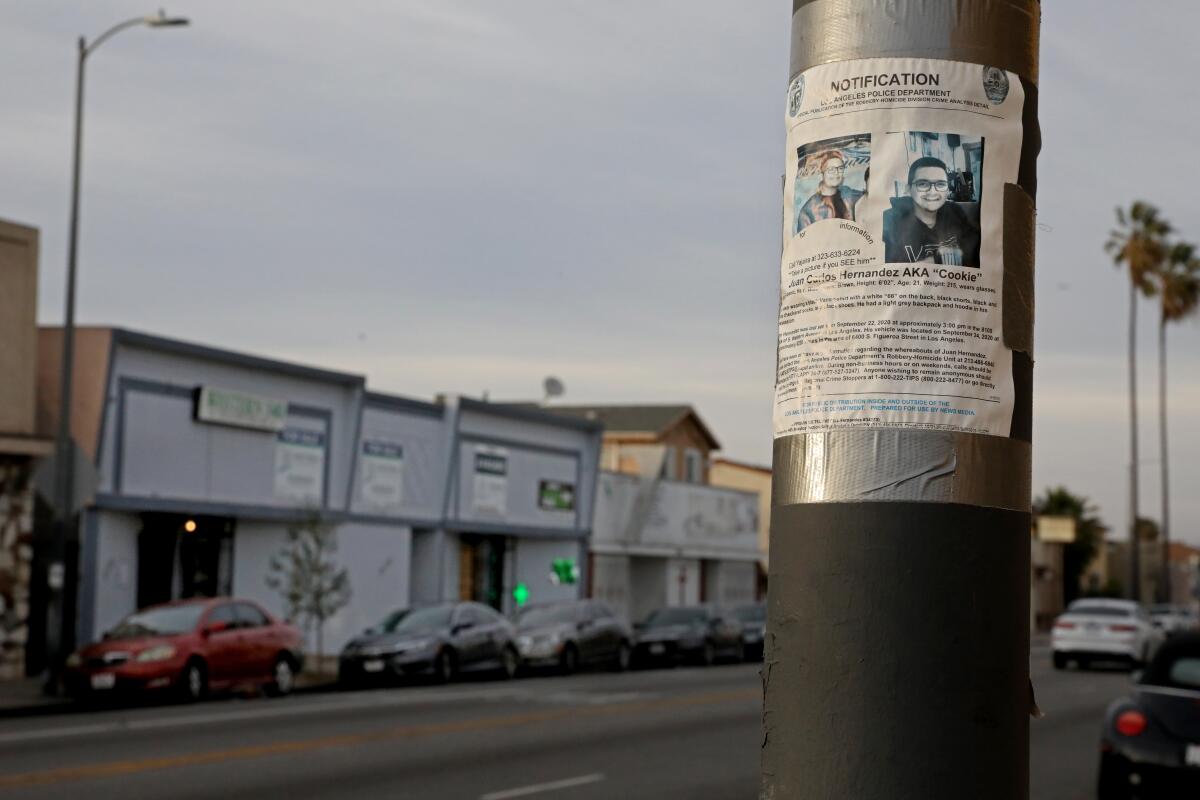
- Share via
Juan Carlos Hernández went to work one afternoon and never came home.
He was one of 3,781 people reported missing last year in Los Angeles. Many were found or reappeared when they were ready. Others, suffering from mental illness or addiction, slipped away from family and joined the growing ranks of homeless people living on city streets.
And some of the cases began with a missing persons report but ended with a murder charge.
Hernández’s mother knew in her gut something wasn’t right when her son didn’t return from his job at a marijuana dispensary. She did the only things she could: She called the police and she started looking. She taped her son’s face on thousands of bus stops and light posts. The search would take her to homeless encampments on skid row, to the steps of City Hall in protest, to remote corners of Southern California and to the dark underbelly of the city’s marijuana industry.
The not knowing propelled her.
::
As she did every morning before leaving for work, Yajaira Hernández peeked into her son’s bedroom around 5:30 on Sept. 23. His bed was empty and still made up. Also gone, she realized with mounting alarm, was her gray Honda Civic, which her son had driven the previous day to his job at a marijuana dispensary in South Los Angeles.
It wasn’t like her son, a 21-year-old student at El Camino College who hoped to transfer to USC to study engineering, to stay out all night and not tell her. And he knew she needed her car to get to work.
His phone was off. Her gut told her something was wrong.
An officer at the Los Angeles Police Department’s Southwest station took a missing persons report over the phone, but seemed dismissive of her worries: He’s an adult, she remembers him saying. He doesn’t have to tell his mother where he’s going.
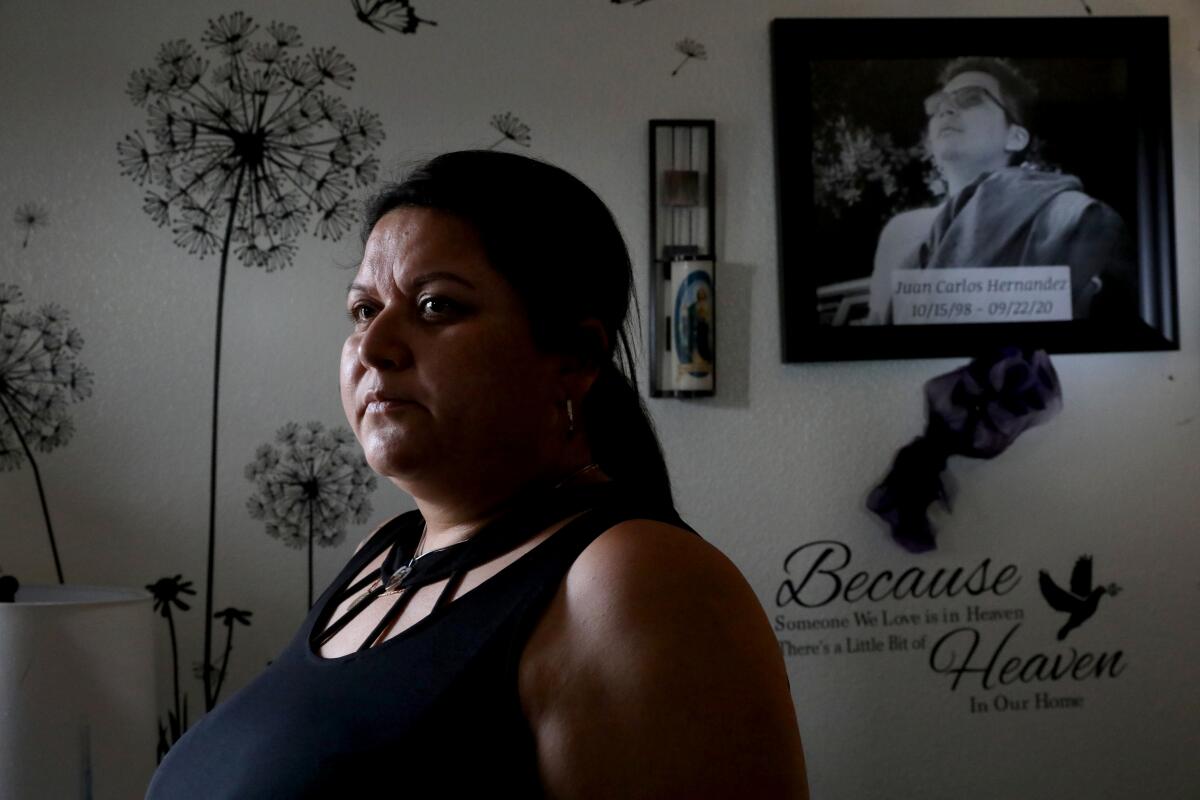
Hernández went that afternoon to VIP Collective LA, the dispensary where for the last six months her son had worked under the table as a “budtender.” She had worried about his safety when he took the job, but his wages helped pay his tuition. And hard as it was, she reminded herself that he was capable of making his own decisions.
VIP Collective LA was one of three pot shops on the same block of Western Avenue between 81st and 82nd streets. All three of the small, shabby storefronts were unlicensed and operating illegally, a detective wrote in an affidavit. VIP Collective LA had no utilities and was powered by a generator.
When Hernández asked about her son, the store’s employees weren’t helpful. She left her phone number and asked that the owner call her.
Her phone rang that evening. The caller identified himself as “E,” the owner of the dispensary. He told Hernández the security cameras at the shop provided only a live feed, so there was no recording that might offer some clues of what happened. He also said he didn’t want the police to get involved.
The suspicion she felt about the phone call soon gave way to dread. Around 2:30 the next morning, some prostitutes working on Figueroa Street flagged down two LAPD officers and pointed out a Honda Civic idling near the corner of 64th Street, according to a search warrant affidavit and what police told Hernández. Her car had been sitting empty, engine running, for hours.
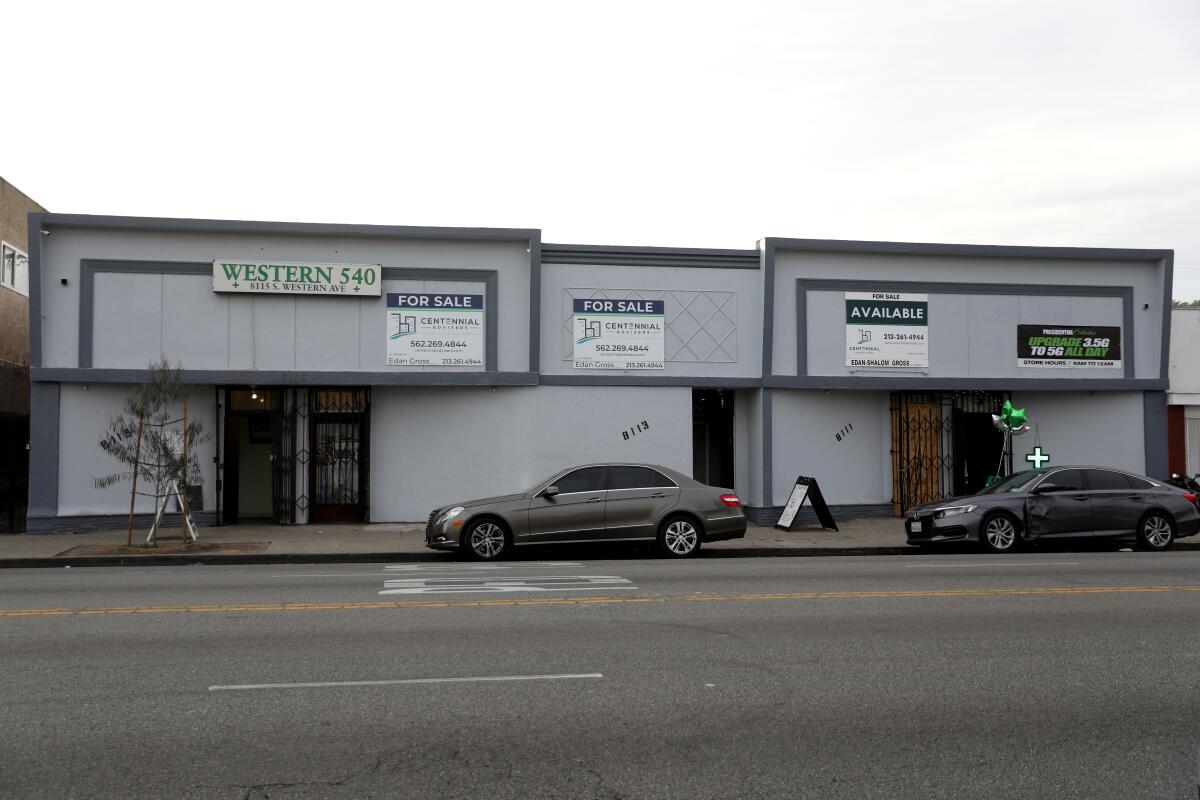
She printed fliers with her son’s photo and, with the help of family, posted them in the neighborhood around the dispensary. People soon called and texted, claiming they had kidnapped her son and demanding a ransom for his return.
When Hernández reported the calls to the police, her son’s case was handed to Jennifer Hammer and Daniel Jaramillo, detectives in the LAPD’s Robbery-Homicide Division who specialize in kidnappings, extortions and other complex crimes. To piece together how the detectives investigated the case, The Times reviewed affidavits the detectives submitted to judges when applying for search warrants.
The detectives were confident the ransom demands were coming from opportunists who had nothing to do with the disappearance. Still, they worried that Hernández’s son had been the victim of foul play. They were troubled by the fact that someone had tried to remotely access his account on a stock-trading app three days after he disappeared.
The detectives got a search warrant for his phone records. The last call he had received was at 10:25 p.m. on the night he disappeared, from the same number E had used to call his mother.
::
Hernández wasn’t leaving the search up to the police. When she wasn’t working, she spent countless hours taping up fliers across Los Angeles, and in Orange, Riverside and San Bernardino counties as well. She blanketed Instagram, Twitter, TikTok and Reddit with her son’s story, signing off each post with the hashtag #helpmefindjuan.
“I’m sorry if I’m overwhelming anyone with my videos, posts or anything,” she wrote on Instagram. “I wish I could do more. I wish I had the knowledge, power or money to do more.”
As word of his disappearance spread, Hernández was getting calls at all hours from people who thought they’d seen him.
One person said a young man who looked like him was at 7th and Hill streets, talking to himself. Another caller said he might have been at 4th and San Pedro. Hernández and other family members checked out every tip, sometimes getting up in the middle of the night to head to skid row.
With each tip, her heart leaped: This is it. This is him.
“It was heartbreaking to come home every time shattered, empty-handed, without my son,” she said.
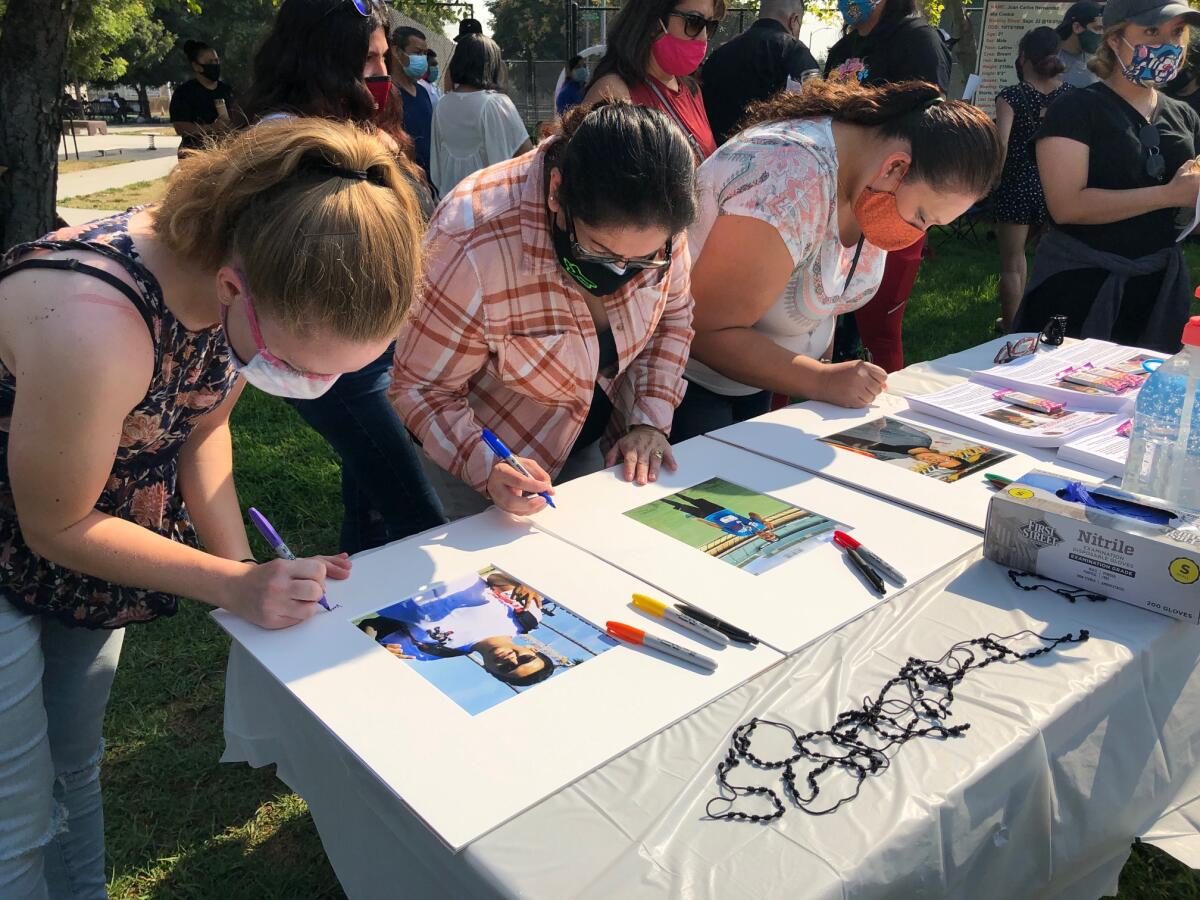
The weeks slid by. Her son’s 22nd birthday came and went. Every time she called, the detectives told her, “We’re looking into it.” She understands now they couldn’t tell her about their investigation, but at the time she believed they didn’t share her urgency — the urgency of a mother whose child is gone.
Hernández’s family began picketing outside LAPD headquarters and City Hall to “let them see that we’re not giving up, that we’re not going anywhere,” she said. Wearing T-shirts printed with her son’s face, they taped fliers to the metal barricades on the steps of City Hall and marched carrying signs.
One read, “I want you to act like Juan was your son.”
::
Armed with a search warrant, the detectives forced open the door of VIP Collective LA early in the morning on Sept. 29. They seized its security camera system and discovered that E had lied to Hernández. The cameras did record.
Yet there was no footage before Sept. 23, the day after Hernández’s son had vanished. Technicians at the LAPD’s lab went to work on the cameras and realized someone had tampered with them. They managed to extract a video file someone had tried to destroy.
The video showed a man and a woman in the dispensary at 6:34 a.m. on Sept. 23. They were wearing gloves and wiping down the shop’s interior with paper towels.
Working off an anonymous tip submitted to a police hotline, the detectives identified the man in the video as Ethan Kedar Astaphan, a bodyguard for the dispensary’s owner, Weijia Peng, who went by James and Jay. The woman was Sonita Heng, Peng’s 20-year-old girlfriend.
Astaphan, a citizen of the island of Dominica in the Caribbean, met Peng while living in the New York City area, according to his mother, Connie Didier. Didier described Peng as “a bad egg.”
“We’d been trying to talk to Ethan about this boy,” she said, adding that Astaphan and Peng moved to California about two years ago. Peng could not be reached for comment.
A judge gave the detectives permission to install a tracking device on Astaphan’s rented Ford truck in the middle of the night, and in early October, officers from the LAPD’s secretive Special Investigation Section began tailing him.
The pieces were coming together, but a day after seeing the video, the detectives learned two of their suspects were no longer in the country. FBI agents alerted them that two weeks earlier, Peng and Heng had purchased same-day tickets to Istanbul, Turkey, by way of Paris and boarded their flight carrying $9,500 in cash.
Detectives suspected there was more footage on the dispensary’s cameras that the LAPD technicians weren’t able to recover. They brought the recording system to a computer forensics specialist in the Glendale Police Department. It took a few weeks, but on Oct. 29, he handed the detectives evidence that made clear what had happened to Juan Carlos Hernández.
The video, which is described in an affidavit an LAPD detective submitted to a judge to obtain a search warrant, showed Astaphan, Peng and Hernández in the dispensary the night of Sept. 22. A few minutes after 11 p.m., Astaphan suddenly took Hernández to the ground, put him in a chokehold and held him down until his body went still, according to the affidavit.
Peng looked on as Astaphan choked Hernández, the detective wrote. He made no effort to intervene, but rather walked to the back of the dispensary, closed the door, then returned to continue watching. Peng exited the frame seconds before the video ended, leading detectives to conclude in the affidavit that he disabled the camera.
::
One of the thousands of fliers distributed by Hernández’s family ended up in the hands of Roy Peoples Jr., a homeless man.
Seeing it, Peoples realized he had heard something the night Hernández went missing. The police described his account of that night in a search warrant affidavit.
Peoples was sleeping in the parking lot behind VIP Collective LA when a sound startled him awake. The lot’s gate was sliding open. He saw headlights and heard someone call out, “Turn around. Back it in.” A vehicle backed up to the rear door of the dispensary and bumped into the building.
Peoples heard the hatch of the vehicle fall open, then grunting noises men make when they are carrying something heavy. He thought someone was robbing the dispensary and perhaps stealing its safe, but he didn’t hear the sound of metal scraping against asphalt. The vehicle drove off down an alley.
Citing cellphone records, detectives alleged in an affidavit that Astaphan, Peng and Heng traveled to an area between Barstow and Baker in the early hours of Sept. 23, then returned to South L.A. Personnel from the LAPD, the San Bernardino County Sheriff’s Department and the FBI began combing that part of the Mojave Desert.
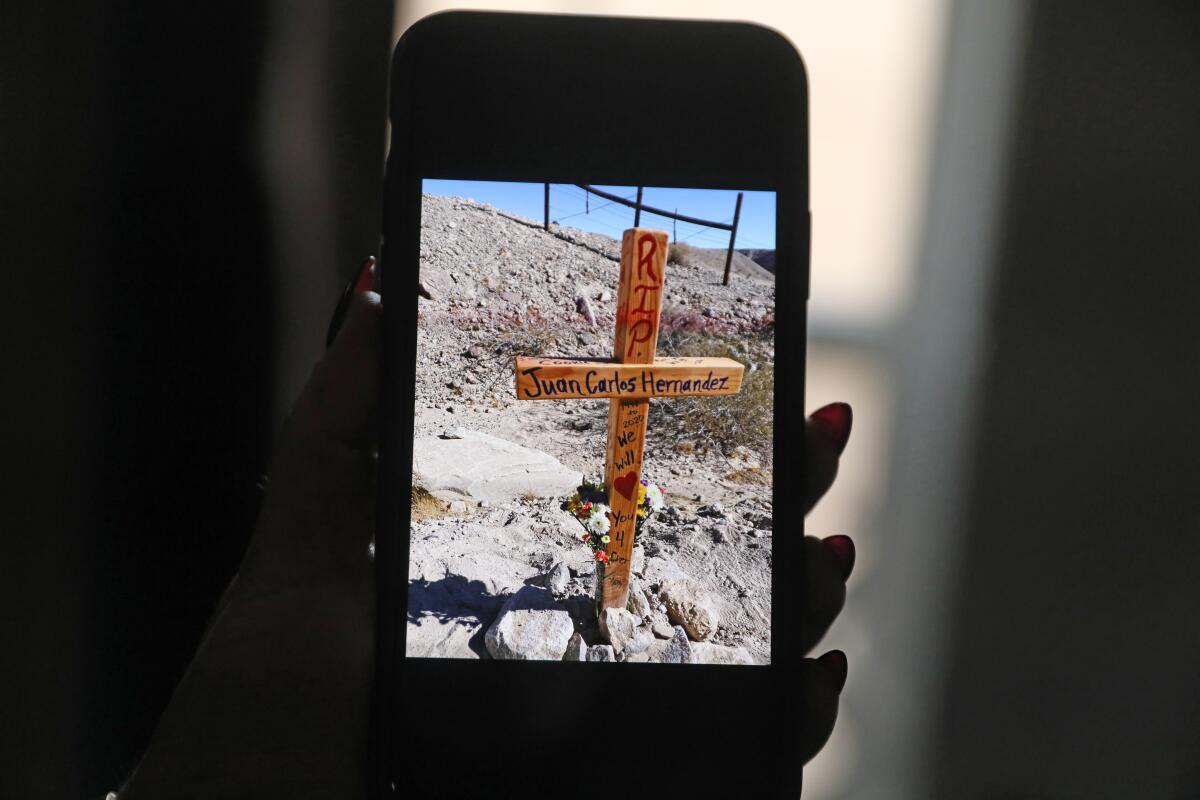
On Nov. 19, Jaramillo and Hammer knocked on Yajaira Hernández’s door. Her son’s remains had been found at the foot of an embankment off the side of a desert road. Astaphan and Heng had been arrested that morning.
Heng had returned to the country a week earlier, alone. If the police know why she came back, they didn’t explain it in their warrants.
Astaphan has pleaded not guilty to murder. His lawyer didn’t return messages requesting comment. Heng has pleaded no contest to accessory after the fact. Her attorney declined to answer questions.
Peng was apprehended last week in Istanbul and is being held pending extradition to Los Angeles on a murder charge. The circumstances of his capture were unclear, said Deputy Dist. Atty. Habib Balian, who is prosecuting the case. Balian declined to discuss a potential motive for the killing.
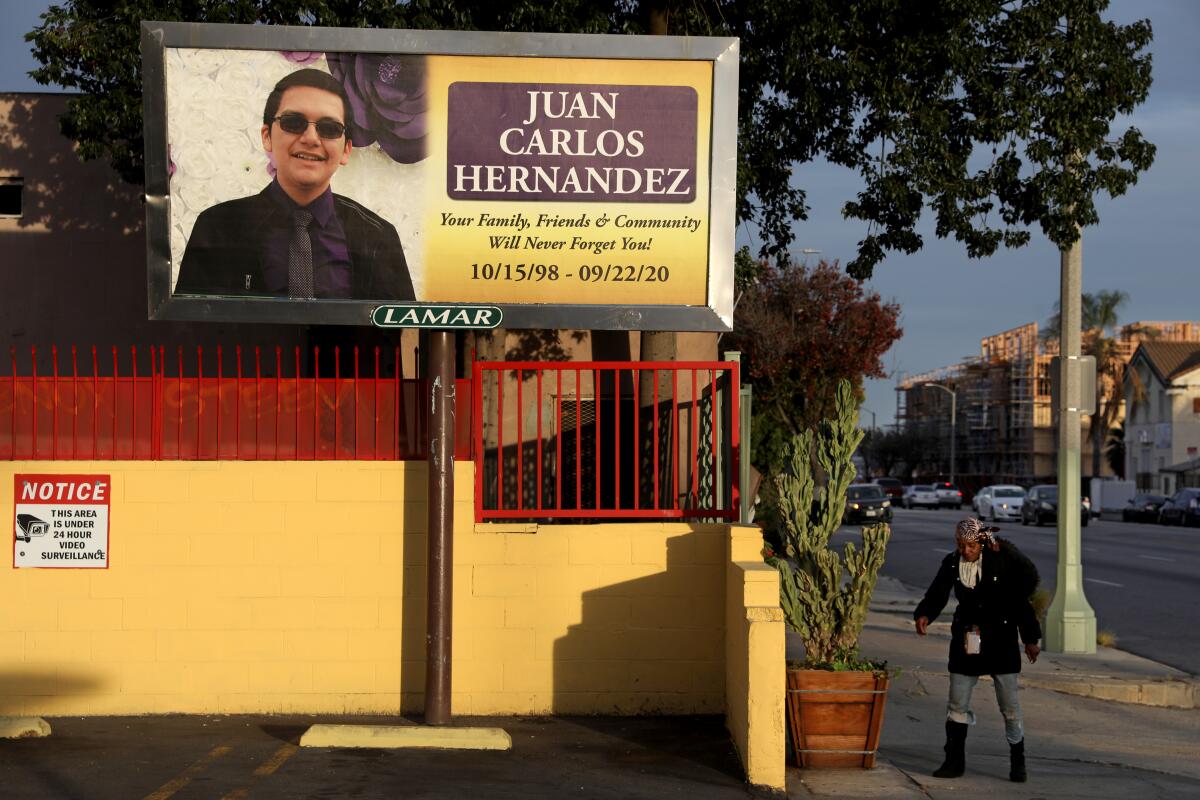
Knowing her son is not lost, hungry or in pain has brought Hernández some solace. She now knows where he is. When she wants to be near him, she goes to Holy Cross Cemetery in Culver City.
But his absence is a hole she does not expect ever to fill. “Any hopes, any dreams I had, they’re gone,” she says. She tries to smile, to laugh when she is around her other children, “but I feel no form of happiness.”
She still sees the fliers when she drives through Los Angeles. When she sees one, she pulls over and takes it down.
A trial provided details into the killing of 16-year-old Brayan Andino but could not explain what a prosecutor called “a culture of death.”
More to Read
Sign up for Essential California
The most important California stories and recommendations in your inbox every morning.
You may occasionally receive promotional content from the Los Angeles Times.










